https://www.moneycontrol.com/news/india/coronavirus-pandemic-slums-are-new-hotspots-that-can-ravage-cities-5090381.html
Coronavirus: the epidemic could easily ravage cities through its many slums
RN Bhaskar — 31 March, 2020
Last week, the government of Maharashtra formally acknowledged a new problem – slums (https://www.mumbailive.com/en/civic/coronavirus-spreads-to-mumbai-slums-and-chawls-in-ghatkopar-kalina-and-patel-as-4-patients-test-positive-for-covid19-47281). Coronavirus which had spread among the relatively affluent had now percolated to the slums. Now they could spread in slums and infect the affluent with several times the earlier intensity.
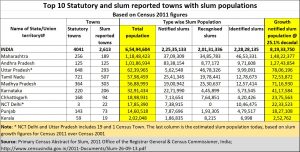 A couple of days later the Central government also changed its strategy for battling the coronavirus epidemic – by focusing on hotspots (https://www.thehindu.com/news/national/coronavirus-with-over-180-fresh-cases-in-24-hours-india-shifts-focus-to-hotspots/article31195396.ece). Just some time earlier, even Raghuram Rajan, former governor of RBI also pointed to the difficulty in dealing with slums (https://www.businesstoday.in/current/economy-politics/lockdown-not-enough-to-contain-coronavirus-in-india-raghuram-rajan/story/399340.html).
A couple of days later the Central government also changed its strategy for battling the coronavirus epidemic – by focusing on hotspots (https://www.thehindu.com/news/national/coronavirus-with-over-180-fresh-cases-in-24-hours-india-shifts-focus-to-hotspots/article31195396.ece). Just some time earlier, even Raghuram Rajan, former governor of RBI also pointed to the difficulty in dealing with slums (https://www.businesstoday.in/current/economy-politics/lockdown-not-enough-to-contain-coronavirus-in-india-raghuram-rajan/story/399340.html).
More slums, more graft
Maharashtra was obviously the most perturbed. It was the slum capital of India (https://www.business-standard.com/article/current-affairs/why-is-maharashtra-india-s-slum-capital-113122600642_1.html). And this is borne out by data from the Census (Primary Census Abstract for Slum, 2011 Office of the Registrar General & Census Commissioner, India; http://www.censusindia.gov.in/2011-Documents/Slum-26-09-13.pdf — see table).
In just one decade, from 2001 to 2011, slum population in India had swelled by 25.1 % as against the average population growth of 17.6%. Since law-abiding folk too look for jobs and flock to cities, the growth rate for both slum dwellers and the rest of the population should have been the same. The big difference suggests that someone had incentivized people to form slums.
And by now, it is common knowledge that one reason why politicians love creating slums is to change the demographics in a specific territory. That ensures that the ruling party’s candidates get elected. It is like stuffing ballot papers in a box (https://www.moneycontrol.com/news/india/comment-the-problem-of-citizenship-and-slum-votebanks-and-the-work-permit-solution-2570637.html).
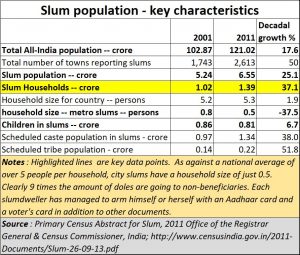 Slums offered the politicians another advantage – the conduit through which more funds could be diverted. Nothing shows this up better than the Census data which shows that the rate at which slum household grew at 37% was higher than the growth of slum population (see chart).
Slums offered the politicians another advantage – the conduit through which more funds could be diverted. Nothing shows this up better than the Census data which shows that the rate at which slum household grew at 37% was higher than the growth of slum population (see chart).
It can be deduced that the primary reason why households grew faster than the growth of slum population is that almost all government incentives (subsidised electricity, gas cylinders, rations etc.) are given to households. Thus, it makes more sense for siblings to call themselves separate households. Since this is not possible without the collusion of the authorities, it is possible that they too shared the booty, which could then find its way to the very top.
How big could this subsidy amount be? That can be deduced from yet another figure – number of people per household. In slums across India, against a normal density of 5.3 people per household, slums had an average size of (gasp!) 0.5. This means that ten times the normal subsidy was billed to slums. The pickings could be unbelievably large.
The sins become a nightmare
And now the slums have become the biggest danger for politicians. Unlike cholera, malaria and diarrhoea which have been around for decades and which affect largely poorer populations, the coronavirus affects the affluent as well. In the initial stages it was largely confined to people who travelled by plane or cruise ships. Now it has reached the slums (https://www.mumbailive.com/en/civic/coronavirus-spreads-to-mumbai-slums-and-chawls-in-ghatkopar-kalina-and-patel-as-4-patients-test-positive-for-covid19-47281). These are the hotspots which could ravage entire city populations far more swiftly than would have otherwise happened.
This is because there is just no way to lockdown a slum. Many people to a room, unsanitary conditions of living, common toilets which don’t get cleaned for days (in Mumbai, many slum dwellers have gone back to open defecation) and poverty. And in this cheek-by-jowl existence, the virus could spread like wildfire.
The only solution is more and more testing – random testing – the way Singapore, Japan and Korea have done (https://www.moneycontrol.com/news/business/coronavirus-pandemic-an-opportunity-to-overhaul-indias-ailing-healthcare-sector-5079501.html). But as all state government officials have stated, there are very few supplies of testing kits.
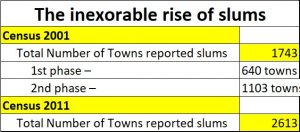 The central government has restricted import of kits to only government hospitals and the 12 licensed private testing laboratories (https://www.businesstoday.in/sectors/pharma/fight-against-coronavirus-two-test-kits-12-private-labs-added-to-india-arsenal/story/399019.html). And contrary to ICMR’s recommendation that the tests be made available free of cost to patients, the private laboratories have been allowed to charge Rs.4,500 per test. That is a price slums cannot play.
The central government has restricted import of kits to only government hospitals and the 12 licensed private testing laboratories (https://www.businesstoday.in/sectors/pharma/fight-against-coronavirus-two-test-kits-12-private-labs-added-to-india-arsenal/story/399019.html). And contrary to ICMR’s recommendation that the tests be made available free of cost to patients, the private laboratories have been allowed to charge Rs.4,500 per test. That is a price slums cannot play.
What the government can do is to peg the price for customers at Rs.100 and pay to the private labs the remaining Rs.4,400. That way tests become affordable but do involve a price to prevent indiscriminate and irresponsible testing. But so far, the central government is unwilling to foot the bill.
The state governments do not want to foot the bill till they are sure that they will get back their share of GST and other amounts right away so that they can pay for such tests. More significantly, they want the right to import testing kits themselves so that they can find more cost-effective alternatives.
For instance, last week, Abbott Laboratories announced that it had come up with a testing kit that could analyse coronavirus infection within 5-13 minutes (https://www.business-standard.com/article/international/test-that-can-detect-coronavirus-in-5-minutes-courtesy-abbott-labs-120032900037_1.html). It has received emergency FDA approval and will begin production of 50,000 kits a day. The pricing is not yet known.
Similarly, there is the UK-based Mologic Ltd, in collaboration with Senegalese research foundation Institut Pasteur de Dakar (https://www.bloomberg.com/amp/news/articles/2020-03-16/ten-minute-coronavirus-test-could-be-game-changer-for-africa), which in three months promises to bring down the cost of COVID-19 testing kits to just $1 and testing time to10 minutes.
The central government should immediately allow state governments to tie up- with such entities and import in bulk such testing equipment to allow large scale testing of slum dwellers (even over and over again, if required). Only such a move will ensure that those confirmed can be immediately isolated for treatment. The spread of the virus can only be stopped by immediately identifying the confirmed and prevent further spread of the disease.
Currently the central government does not permit state governments to import or to licence its own testing centres. This must be modified, because states must deal with slums, which they created in the first place, often in collusion with the centre. Similarly, for drugs like hydroxychloroquine – which the ICMR has already identified as a prophylactic for frontline warriors like doctors and paramedic staff – the government should immediately licence production of larger quantities. Most drug stores do not have this item, as it has got sold out.
All this is required in slums. This is because the growth of slums in cities has been an epidemic by itself. Go back to the census figures. You will discover how the number of cities with slums increased from 1,743 in 2001 to 2,613 in 2011. Today there could be at least double that number. The focus on hotspots is understandable. The urgency is palpable. The only solution is more testing, and affordable (even free) testing.
If the central government does not do this, the result could be a wildfire that nobody will be able to control.





























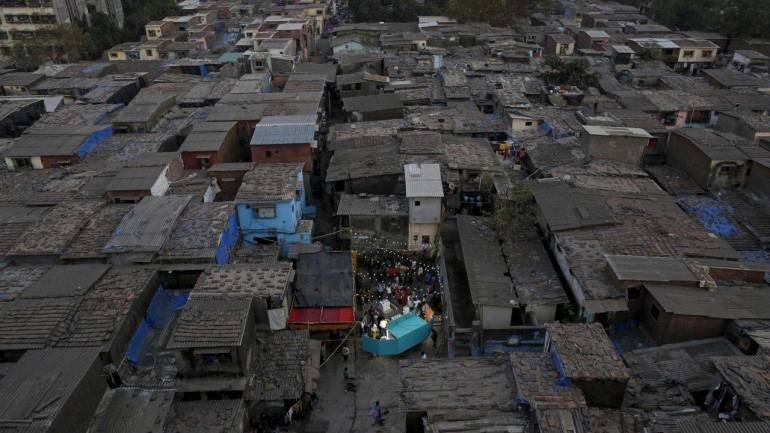


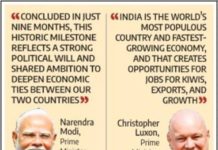









COMMENTS